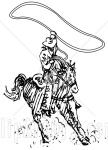Important anniversaries
 This weekend is Labor Day. In the Florida Keys that usually means some commemoration of one of the strongest hurricanes to hit the continental United States -- the Labor Day Hurricane of 1935. It swept across Islamorada in the Upper Keys and killed an estimated 408 people, many of them World War I vets working on a New Deal relief program to build a highway in the Keys. It also destroyed the Overseas Railway, Henry Flagler's final achievement, which connected the Keys to the mainland for good. The railroad was not financially worth rebuilding; much of the roadbed and most of the magnificent bridges were converted for use in the Overseas Highway. You can see a lot of them today, alongside the replacement bridges that were built in the 1970s and '80s.
Why is this a topic for a book blog? For one thing, I have written many times about the railroad and interviewed survivors, for an oral history series I wrote for the Miami Herald in the 1990s and an oral history compilation I put together for the Herald's late, lamented Tropic Magazine. But more currently, my current employer the Monroe County Public Library has just posted more than 700 images related to the railroad to our Flickr account, and these images (including the one above) are something to see. Historian Tom Hambright wrote a blog post about the images and the railroad for our website [link to be provided once the library website recovers from whatever database affliction it is currently suffering].
This weekend is Labor Day. In the Florida Keys that usually means some commemoration of one of the strongest hurricanes to hit the continental United States -- the Labor Day Hurricane of 1935. It swept across Islamorada in the Upper Keys and killed an estimated 408 people, many of them World War I vets working on a New Deal relief program to build a highway in the Keys. It also destroyed the Overseas Railway, Henry Flagler's final achievement, which connected the Keys to the mainland for good. The railroad was not financially worth rebuilding; much of the roadbed and most of the magnificent bridges were converted for use in the Overseas Highway. You can see a lot of them today, alongside the replacement bridges that were built in the 1970s and '80s.
Why is this a topic for a book blog? For one thing, I have written many times about the railroad and interviewed survivors, for an oral history series I wrote for the Miami Herald in the 1990s and an oral history compilation I put together for the Herald's late, lamented Tropic Magazine. But more currently, my current employer the Monroe County Public Library has just posted more than 700 images related to the railroad to our Flickr account, and these images (including the one above) are something to see. Historian Tom Hambright wrote a blog post about the images and the railroad for our website [link to be provided once the library website recovers from whatever database affliction it is currently suffering].
The other anniversary is upcoming -- in 2012 we in the Keys will be marking the centennial of the railway reaching Key West -- on Jan. 22, 1912, Henry Flagler himself rode the "first train" onto the island and was greeted by, essentially, the entire town population. The Key West Art & Historical Society is already planning a major exhibit, which I can't wait to see, and I'm sure many other events will spring up. If you're looking for a readable account of the railroad's construction and destruction, I recommend Les Standiford's Last Train to Paradise. There are a bunch of others that focus solely on the hurricane; I like this one because it captures both ends of this epic, tragic story that changed and defined the Keys.
![Lady_Sarah_Bunbury_Sacrificing_to_the_Graces_1765[1]](http://boneislandbooks.files.wordpress.com/2010/07/lady_sarah_bunbury_sacrificing_to_the_graces_17651.jpg?w=88)

